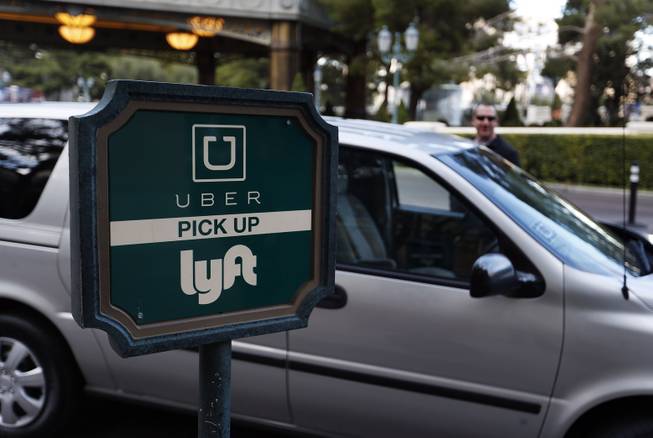
John Locher / AP
In this Jan. 14, 2016, photo, a driver waits to pick up passengers at an Uber and Lyft pickup area at the Bellagio in Las Vegas.
Thursday, July 21, 2016 | 2 a.m.
Walk near most cab lines in Las Vegas and the taxi industry’s wounds from battling Uber and Lyft last year are immediately apparent. Tacked to the back of many taxicabs is an anti-Uber sticker showing the San Francisco company’s logo inside a red circle with a diagonal strikethrough.
Nearly a year since Uber and Lyft started operating in Las Vegas, their drivers outnumber cabbies, and the companies have cut into the taxi industry’s market, particularly where they once reigned — at the airport and along the Strip. But taxi forces are likely not done pushing to regulate the ride-hailing firms.
It comes down to one thing: FBI background checks.
The taxi industry and some legislators have long maintained that the pre-employment checks Uber and Lyft conduct on drivers are not as comprehensive as FBI background checks used by cab companies. For ride-hailing companies, who argue that their procedures are safe, that regulation is a nonstarter.
Some see it as a way to push out ride-hailing companies. When voters in Austin, Texas, upheld an ordinance requiring FBI background checks in May, Uber and Lyft pulled their operations from the market. Taxi companies argue that FBI background checks are a matter of public safety, and several sources in the cab industry said there is interest in bringing them to Nevada, which would require new legislation.
“There’s a lot of interest in the background check because of public safety,” said John Mowbray, a lawyer who represents Frias Transportation Management, which operates one of Las Vegas’ largest cab companies.
A lobbyist for Frias said in a separate interview that the company’s legislative plan is not finalized.
Much of this was litigated during the last legislative session. After several tense months in 2015, the Legislature passed a framework to regulate Uber and Lyft. By the fall, they were operating in Clark County. While taxi and ride-hailing industries now coexist, tensions have continued.
The ride-hailing companies expanded so fast that within months their driver base in the market had eclipsed the number of taxi drivers. As of May 2016, about 19,500 Uber and Lyft drivers were registered in Clark County, about double the number of cab drivers registered to operate.
In February, taxicab giant Bell Transportation hired a private investigator who identified several illegal off-platform Uber and Lyft rides — where drivers were paid cash rather than through the app — during a convention. Neither Uber nor Lyft condone this activity, which deprives them of their cut of the fare.
As Uber and Lyft expand further into the Las Vegas market through the end of next year, their positions could become precarious if the issue of background checks re-emerges in the 2017 legislative session.
Senate Minority Leader Aaron Ford said he thinks that the issue is likely to be considered. “I certainly think that the idea of background checks is ripe for discussion during the next session,” he said.
During the 2015 session, Ford pushed for language requiring Uber and Lyft to conduct FBI background checks. That language did not make it into the final bill. As a consolation, legislators tasked the Nevada Transportation Authority, which regulates ride-haling, with compiling a report on the issue.
The report, presented to an interim legislative committee in April, was meant to compare the commercial background-check procedures of Uber and Lyft with the FBI fingerprint-based background checks required of the taxicab companies. Regulators, however, were unable to provide a complete study because they said they were hampered by a lack of statutory authority and funding to cover costs.
“I was disappointed then,” Ford said of the report. “I made it known. I remain disappointed.”
Ford said exploring FBI background checks is necessary to ensure the public’s protection. “In no way do I see this as an effort to push out Uber and Lyft,” the Democratic senator said. “It’s more of a public-safety concern.”
Responding to Ford’s comment, Republican Assemblyman Derek Armstrong said the FBI background check issue is indeed an effort to get rid of Uber and Lyft, and that proponents push it using false arguments about public safety. "Since the law has been enacted, we haven’t seen any public-safety concerns that would lead me to believe that it is as ripe as he believes it to be,” Armstrong said.
The trade organization for Las Vegas taxicabs declined to comment on this story.
Uber and Lyft shy away from FBI background checks, which are typically more costly and often take months longer to process. Instead, the companies use commercial background checks that rely on criminal database searches by Social Security number rather than a biometric identifier, like fingerprints.
The NTA report said both Uber and Lyft’s pre-screening process is in compliance with legislative requirements. Uber’s third-party background check provider examines each applicant’s seven-year criminal history in a number of federal, state and local databases. Drivers with felonies and major driving violations are denied. Uber has said this process can be more accurate because the database behind the FBI background check shows all arrests but is not always updated to show convictions.
"Every Uber driver-partner undergoes a pre-screening process before he or she is allowed to access the platform,” Taylor Patterson, an Uber spokeswoman, said in an email. “This includes both a criminal and driving history check, as well as minimum vehicle requirements."

Join the Discussion:
Check this out for a full explanation of our conversion to the LiveFyre commenting system and instructions on how to sign up for an account.
Full comments policy